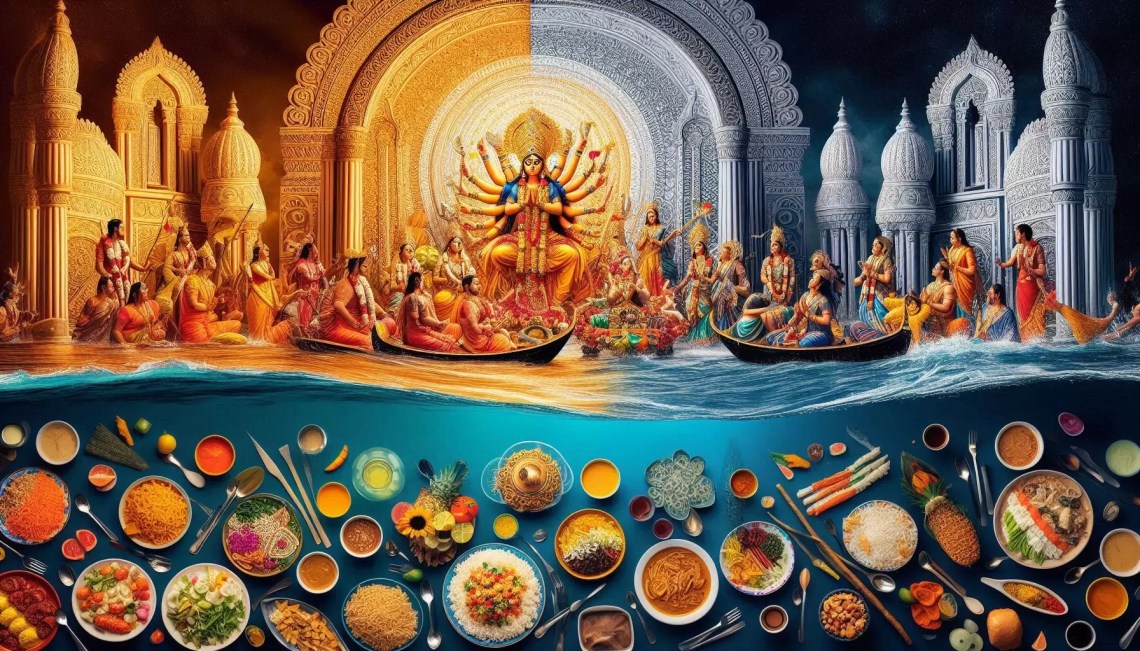The Unique Blend of Feasting and Fasting: Why Bengalis Worship Durga and Eat Non-Veg During Navratras While Others Fast.
Feasting and Fasting Navratri traditions highlight India’s cultural diversity. While some fast and abstain from meat, Bengalis celebrate Durga with grand feasts, blending devotion with culinary joy and abundance.
Feasting and Fasting Navratri Traditions
Navratri, the nine-day festival dedicated to the worship of Goddess Durga, holds deep religious significance across India. However, in the eastern part of the country, particularly in Bengal, a unique cultural twist emerges. While many in India observe strict fasting and abstain from non-vegetarian food during Navratri, Bengalis celebrate this time with grand feasts, often including fish, meat, and other delicacies.
This cultural juxtaposition might seem contradictory at first, but it is deeply rooted in the historical, religious, and cultural nuances of the region.

The Divine Connection: Durga as the Warrior Goddess
In most parts of India, Navratri is a time of fasting, penance, and devotion. Goddess Durga is worshipped as the epitome of power, and devotees offer their prayers, seeking her blessings. Fasting during this period is seen as a way to purify the body and mind, connecting spiritually with the goddess.
However, in Bengal, Durga is not just a goddess of spiritual strength but also a warrior deity. The Bengalis believe that during these nine days, Durga descends to earth with her children—Lakshmi, Saraswati, Ganesha, and Kartikeya—signifying her return to her maternal home. It is a time of celebration, family reunion, and the welcoming of the divine into the human world.
In this context, Bengalis offer a feast to Durga, much like they would for any honored guest. Food, including fish and meat, is not considered a taboo but rather an essential part of this hospitality. The goddess is revered as a warrior, and warriors are often associated with strength, nourishment, and indulgence in hearty food. Thus, the consumption of non-vegetarian food becomes a cultural expression of joy and abundance during Durga Puja.
The Historical and Cultural Influence
Bengal has always had a rich cultural heritage that blends the sacred and the worldly. Historically, the region has had a robust tradition of Shakta worship, where Goddess Durga is seen as the ultimate divine power. Unlike other parts of India, where vegetarianism became a marker of purity, Bengal’s geography and history allowed for a more liberal approach.
The abundance of rivers and seas in Bengal made fish a staple part of the diet, and the agricultural lifestyle encouraged a hearty, balanced diet, which included meat. Over time, these elements were incorporated into the religious customs of Durga Puja. The goddess, being seen as a mother figure in Bengal, is offered the best of everything, including rich and sumptuous meals that contain non-vegetarian fare.
This practice also highlights a unique trait of Hinduism—it’s a religion that allows for diverse interpretations and customs, adapted to the local culture, geography, and traditions.
The Fasting Segment: Devotion and Abstinence in Different Regions
While Bengalis feast, many in other parts of India observe strict fasts during Navratri. This contrast can be understood through the lens of regional religious customs. In northern and western India, Navratri is a period of penance and inner purification, where devotees abstain from eating meat, onion, garlic, and grains to focus entirely on their spiritual practices.
This form of worship is rooted in the sattvic tradition, which promotes purity of mind and body. Sattvic food is believed to help control emotions, enhance focus, and strengthen the connection with the divine.
Both practices—feasting and fasting—are ways to honor the goddess, though expressed differently. For some, fasting is a means of penance, a way to cleanse and prepare themselves to receive the goddess’s blessings. For others, especially in Bengal, the act of feasting represents joy, abundance, and the nurturing aspect of Durga as the mother goddess.
All you need to know about Navratri Fasting
The Cultural Balance: Unity in Diversity
What makes Hinduism fascinating is its ability to accommodate such diverse practices within the same festival. Both fasting and feasting serve the purpose of connecting with the divine, albeit in different ways.
For Bengalis, the act of eating non-vegetarian food during Durga Puja is not seen as a break from spirituality but as an integral part of their devotional practices. The feast represents life, vitality, and the belief that Durga comes to earth to bless her devotees with strength and abundance. It is a celebration of life, not a withdrawal from it.
On the other hand, for those who fast, the abstinence from food is a way to rise above physical needs and focus on the spiritual. Both approaches—whether through indulgence or abstinence—offer a path to divine connection.
Conclusion: One Goddess, Many Ways of Worship
The diversity of Navratri celebrations across India speaks volumes about the flexibility and inclusiveness of Hinduism. Whether one fasts or feasts, the intent remains the same: to honor and connect with the goddess. Bengalis, through their unique customs, remind us that devotion can be expressed in many ways—through celebration, food, music, and festivity. For others, fasting and penance serve as the ideal path to divinity.
In the end, it’s the spirit of devotion, love, and reverence for Goddess Durga that unites worshippers, whether they are enjoying a rich feast or offering their prayers with a pure, sattvic heart.
You may like to read: Ancient Indian Temples: Why We Should Visit Temples
Discover more from Boundless Blogger
Subscribe to get the latest posts sent to your email.





